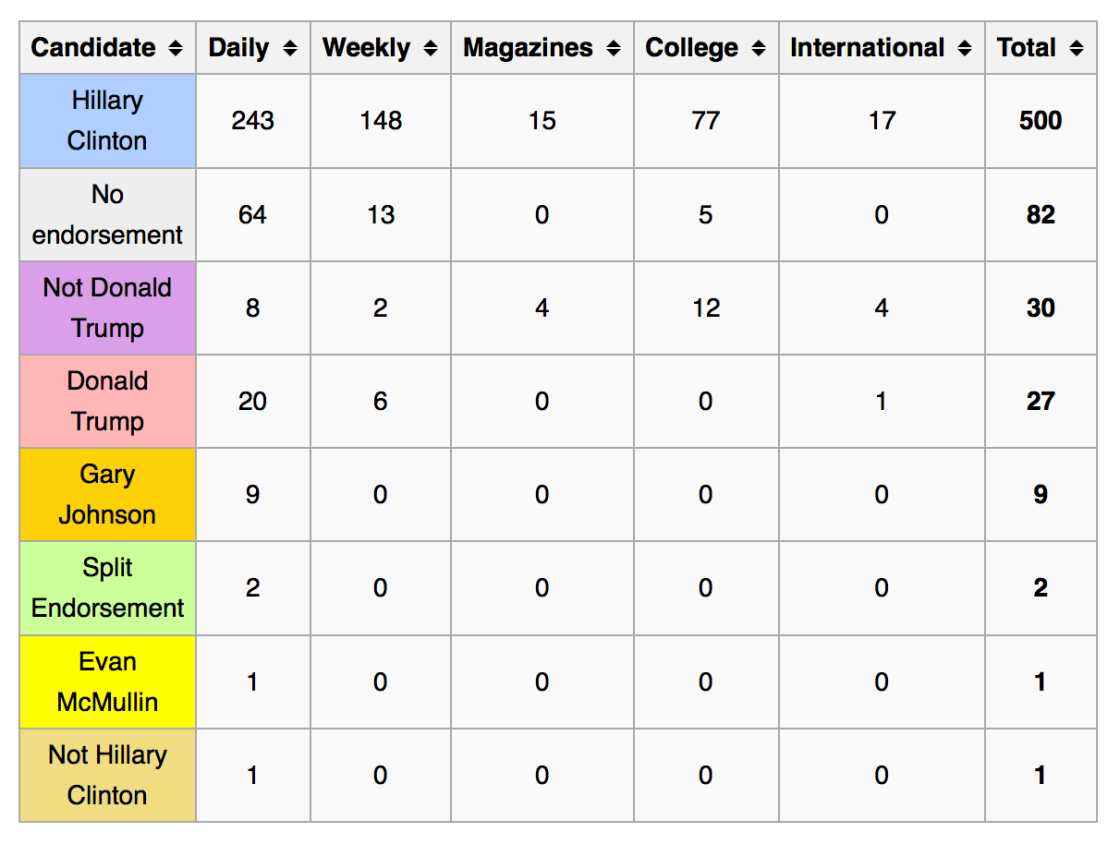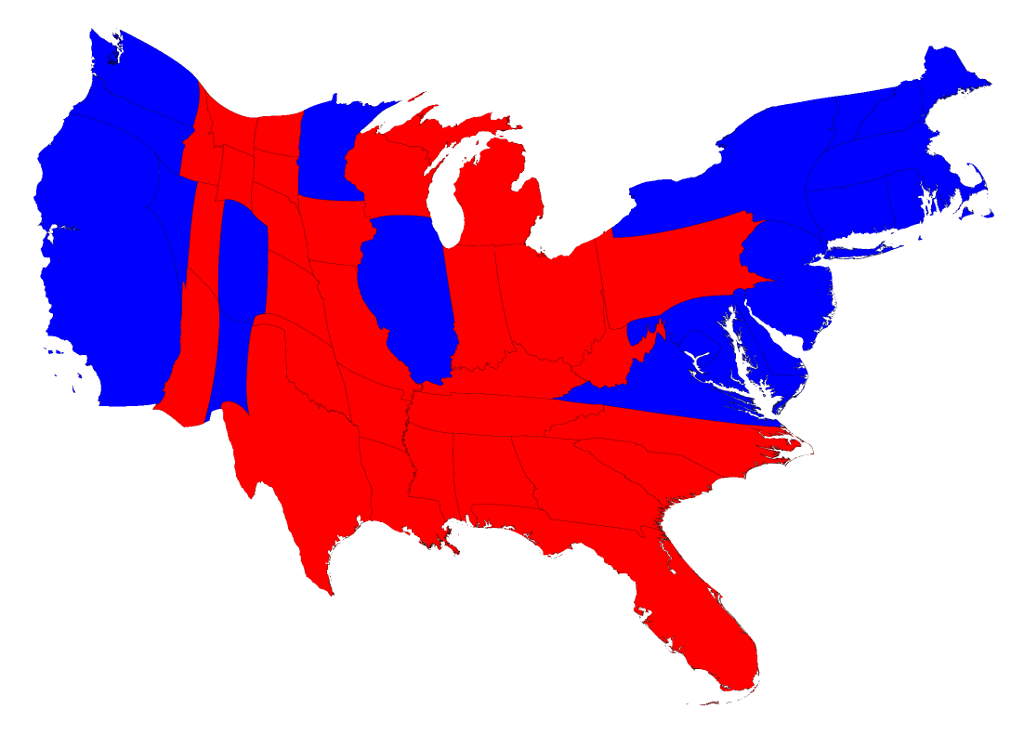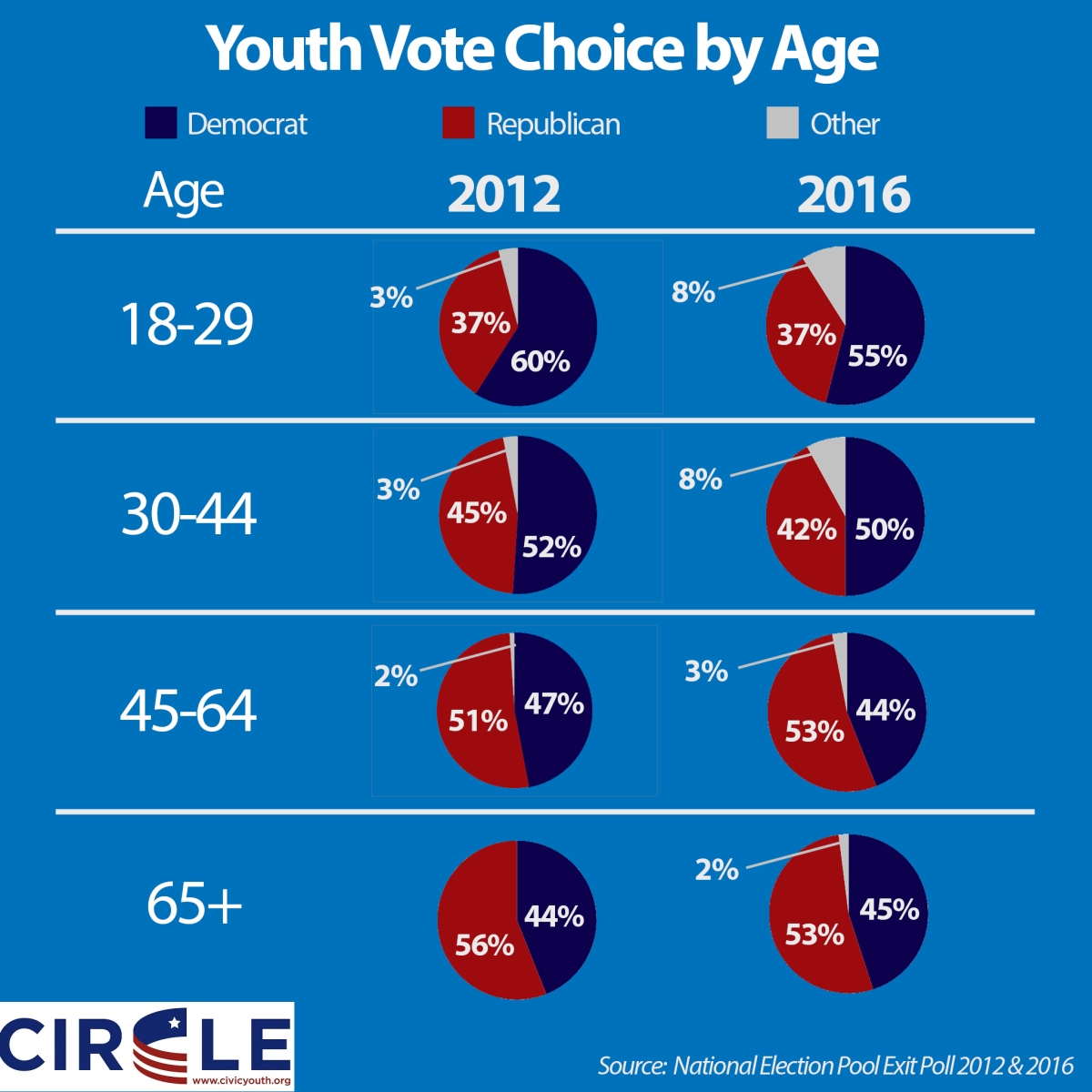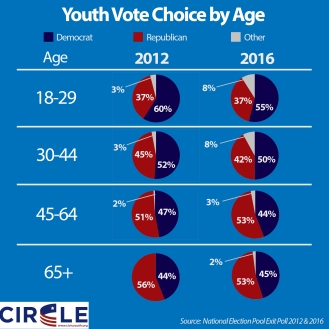Well that was certainly a surprise.
On the morning after the election, as I opened my eyes to the sound of my two year-old son calling for me, my wife told me Donald Trump was our president. We’d gone to bed before things were clearly in his favor, but in hindsight, the writing had been on the wall. Savannah Guthrie put it well when she said that Trump’s campaign and inevitable election is “a middle finger to the establishment.” Clearly, many others also wanted to flip the establishment off.
There were forecasts, projections, and exit polls. But it was when he took Florida that I considered things were a-changing, and when I saw that seven states that had previously voted for Obama twice before were taken by Trump, I knew that this was a monumental moment. For better or for worse.
I am a bit terrified as well as a bit excited for what is to come. How will the transition look from the current presidency? Will it be charitable or volatile? And if so, on whose part? Will Congress, which is now predominately comprised of republicans, overturn Obamacare? How about Roe v. Wade?
There is something massively Shakespearean about this whole thing. No poison vials, no daggers thrust rightly into the back of leaders, no ghostly apparitions spreading immense dread amongst tortured peoples or on harangued leaders. Rather, it’s captured nicely and briefly in a passage of Macbeth.
When the Second Witch witnesses the King approaching, she utters that “Something wicked this way comes,” a statement that is as much an indictment as it is a prophesy of Macbeth’s treacherous fall into corruption and violence. As I see it, this perfectly compliments our past raucous and vile election season, between two very, very unlikable and immoral candidates. Like Macbeth, having been tempted by power and a lust for more of it, both candidates have shown themselves to be wanting, in two ways: first, in wanting more power; and second, wanting in character.
So with that said, I’d like to take a few minutes to lay out some afterthoughts I’ve had since Trump’s victory.
I. Election Results
The key takeaway here is that Trump triumphed across rural America (or as it is often pejoratively called, flyover country) and that his win was astronomically under-predicted. No one thought he could do it. But there is something curious about this moment: that there are so many people who are seriously dumbfounded by his victory.
I mean, really? If you think that, I’m actually not sure where to begin. Let’s start here, with J. D. Vance reflecting on his surprise at Trump’s win:
To suggest that Trump voters are worried about anything real is to invite scorn from certain corners of the mainstream media. The “economic anxiety” tweet, a special brand of sarcasm that mocks the suggestion that Trump supporters are buttressed by economic forces, has entered the online lexicon. Many cannot stomach the fact that people are driven to Trump by anything besides racism.
Yet the decline felt in certain corners of the country isn’t just about economics; it’s about every element of life — from family to life expectancy to the drugs that have infected communities. The feeling that so many of America’s opinion leaders see your concerns as the product of stupidity at best, or racism at worst, confirms the worst fears of many. They already worry that the coastal elites don’t care about them, and many among those elites seem happy to comply.
That so many fail to see this is evidence of a remarkable division of experience and geography in our country. I thought I was above this divide, and I looked down on the coastal elites for living in their bubble. But I was wrong.
Everyone in the media and their mother endorsed Hillary Clinton. This is not an exaggeration. Don’t believe me? See the chart below.

Wikipedia
Letters rolled into The New York Times’ office following the surprise. Here is an interesting one, taken from an article by the paper’s Public Editor, Liz Spayd. Nick Crawford of Plymouth, Michigan writes:
Perhaps the election result would not be such a surprise if your reporting had acknowledged what ordinary Americans care about, rather than pushing the limited agenda of your editors,” he wrote. “Please come down from your New York City skyscraper and join the rest of us.
But it wasn’t only Clinton voters that were surprised. The shock of such a win was a surprise to everyone. I certainly didn’t expect Trump to take the election, and much of my daily reading comes from any one of the major media outlets that express a sense of unified and monolithic bias. One would assume, reading The New York Times, for example, that Donald Trump didn’t have a chance.
Serving as a timely illustration, as only he can do, Rod Dreher brought some much needed sarcasm to the Twitter world leading up to the election night:
The most powerful media outlets in the United States are committed to promoting a liberal agenda (often of the progressive sort), espousing a prejudice and willingness to destroy and vilify anything that smacks of conservative thought. Obviously, this is not true of every outlet and of every journalist. But as a general rule, the day-to-day work that is done is of a certain kind, and is reflective of two things: 1) a polarization of political ideology existing in our culture; and 2) a privilege given to the political ideology of the left. A chasm exists. As David Brooks states, “We are a far more divided society than we realized.”
So the bias is real, and the shock, felt by everyone. Everyone was so dumbfounded, The New York Times had to literally draw a map for their readers in order to show how Trump had beat Clinton.
And then, of course, there are the protests. And there are more protests.
While I can appreciate and understand why people are upset, I am uncertain as to the whether these protests are sound. Alongside having in office one of the most volatile and under-prepared individuals as the President-elect, there is the issue of his known racism, misogyny, sexism, and vulgarity. And it is the Constitutional right of these protestors to gather, in order to protest the presidency of Donald Trump. So what does it mean to protest the legally enacted end result of an election that (I’m assuming here) everyone took part in? Is it self-refuting to protest?
II. Election Commentary
Let’s turn now to some of the commentary that has ensued since Trump’s victory. The internet has been abuzz with critical commentary, diatribes, mourning, but also charitable moments of reflection. So without further ado, let’s take a look at some of the voices that have struck me in the last couple of weeks.
Jamelle Bouie of Slate begins his article, titled “There’s No Such Thing as a Good Trump Voter” by stating that,
Donald Trump ran a campaign of racist demagoguery against Muslim Americans, Hispanic immigrants, and black protesters. He indulged the worst instincts of the American psyche and winked to the stream of white nationalists and anti-Semites who backed his bid for the White House. Millions of Americans voted for this campaign, thus elevating white nationalism and white reaction to the Oval Office.
But it is the next line that is most important to note: “Understandably, critics of Trump have used this to condemn Trump voters, tying them to the likely consequences of their vote, blaming them for foisting Donald Trump on the country and the world.” (emphasis mine)
In essence, Bouie makes the circular argument that there is no such thing as a good Trump voter, simply because there is no such thing as a good Trump voter. He continues with examples of hate, bigotry, and racisim shown to immigrants, minorities, etc., all by supporters of Trump:
Millions of Americans are justifiably afraid of what they’ll face under a Trump administration. If any group demands our support and sympathy, it’s these people, not the Americans who backed Trump and his threat of state-sanctioned violence against Hispanic immigrants and Muslim Americans. All the solicitude, outrage, and moral telepathy being deployed in defense of Trump supporters—who voted for a racist who promised racist outcomes—is perverse, bordering on abhorrent.
I’m still working this out, but as I see it, the problem with Bouie’s thinking here is that he assumes too much about the nature of why these people supported Trump, and that being a supporter of Trump and not being a racist are mutually exclusive concepts. So those that voted for Donald Trump, whether or not they were racists to begin with, voted for racism by supporting his campaign?
Obviously there is something about supporting Trump that Bouie sees as incongruent with being a “good” (to borrow Bouie’s word) citizen. But I wonder what that is.
I should make it clear that I don’t want to misunderstand Bouie, nor saddle him with anything he’s not committed to. Perhaps in his view, supporting Trump disqualifies one from this “goodness,” and somehow commits you to being a racist (even if you don’t realize you are one). Perhaps in voting for Trump – despite all of his vile character flaws and hateful speech – you are behaving as if Trump’s racism (and the like) is not a deal breaker for you, which could be understood as a type of racism.
But I’m not sure this is necessarily racism – that is say, to vote for an overtly racist man is not a racist act. I think the most you can say is that by supporting him, you are simply tabling the issue of racism in order to make a vote. After all, where would it stop if we said this? Is this actually how we make decisions in any other arena? Am I supporter of lying because Clinton has been shown to lie? Or of marital infidelity because Trump has been unfaithful to his wife and is on his third marriage? Where, then, would it stop?
I just don’t see this way of thinking as being helpful at for making sense of Donald Trump’s political support.
Moving onto other voices, there are some that have called this election and its surprising turn, “a failure of expertise on the order of the fall of the Soviet Union or the Vietnam War.” Others have called it “a rejection of the media’s obsession with itself.”
David Brooks has called the populism of the “Trump/Le Pen/Brexit variety” a warning sign of a dysfunctional system, and urges others that if “you want to take that warning sign and dismiss it as simple bigotry, you’re never going to pause to understand what’s going on and you will never know how to constructively respond.”
Offering something of an olive branch, William Saletan at Slate sees the “deplorables” as only one of the five baskets that make up the Trump voters.
David Dayen over at the New Republic does some serious soul searching. I’d like to share some of what he said:
No, this was a rage election: a rage built up over many years, among people who’d decided they were disrespected, abandoned, and voiceless.
Liberals weren’t completely caught unawares. We recognized the rage—how could we not? We saw it in our social-media feeds all year. We read (and wrote) endless articles featuring reporters edging out to Red America, armed with a notebook and a pretense of empathy, to see what Trumpism was all about, why the fever seemed to be running so high among these people.
And what did that produce? The daily filling of a basket of deplorables. I sometimes refer to it as “point-and-laugh” liberalism. Our relentless mockery of Trump and his followers helped fuel the backlash and make it spread.
Then there is this unhelpful commentary, propagating for a bifurcation of America’s unity. I don’t even know where to begin. I’m reminded of Thucydides’ timely caution, which I shared on the day of the election.

Mark Newman, University of Michigan
Damon Linker at The Week recently offered a very candid warning to liberals to check their historical presuppositions, because they’re false. He qualifies this by saying that this does not make the goals of liberals unworthy. Rather, there is just no reason to think that these goals will win out in the end. “History doesn’t have sides” as Linker puts it.
Then there is this startling passage:
Imagine for a moment what your life might be like as a unemployed middle-aged white woman in a small town in a rural part of a Midwestern state. Your quality of life has been declining since the biggest employers in town closed up shop after the passage of NAFTA. Things got far worse after the financial crash hit in 2008. You voted for Obama and hoped he might change things, making your life marginally better. But instead, things have only gotten worse. Job losses have continued. Family and friends are unemployed, living off of disability checks, purchasing groceries with food stamps. Some are addicted to pain killers, with an old high school friend recently dying in an overdose. Bills, including for health insurance under ObamaCare, keep going up and up.
Meanwhile, Obama has spent his second term enforcing environmental regulations that could close the coal mine in the next county over, working on another trade deal that you fear will only decimate your town even more than it already has been, and circumventing Congress to admit more low-skilled labor into the workforce, where these immigrants will compete with long-time residents for the very few entry-level jobs that can still be found in your corner of the state. And now Hillary Clinton has doubled down on Obama’s immigration goals and offered very little by way of policy that gives you hope for improvement.
Instead, Clinton keeps ranting about the racism, sexism, and bigotry of Donald Trump — and now she’s been caught on tape calling his supporters “deplorable.” You’d been tempted by parts of his message, like when he promised at the Republican convention to be your voice, bring back good jobs, and improve your lot in life. But you didn’t seriously consider supporting him until Hillary Clinton talked that way about your Trump-supporting parents, brother, and neighbors. They’d always said that things would never get better as long as the elitists out East spit in your faces. Maybe they were right after all.
Linker then asks whether this is a person who resides on the wrong side of history.
Devastating rhetoric. Linker seems sympathetic to the wants and needs of others who are quite unlike him. He seems confident that the answer to why the machine is broken is not at all because a grab-bag of racists finally got someone to represent them. Rather, he seems convinced that liberals (of which he’d likely place himself) and specifically liberals in positions of power, have been asking for it.
In his article entitled, “Stop Shaming Trump Supporters,” Michael Lerner fires off that many of these Trump supporters “very legitimately feel that it is they who have been facing an unfair reality.” He continues:
The upper 20 percent of income earners, many of them quite liberal and rightly committed to the defense of minorities and immigrants, also believe in the economic meritocracy and their own right to have so much more than those who are less fortunate. So while they may be progressive on issues of discrimination against the obvious victims of racism and sexism, they are blind to their own class privilege and to the hidden injuries of class that are internalized by much of the country as self-blame.
Likewise, David Wong begins his article for Cracked by disclosing that he was raised in Trump country, adding that if he hadn’t moved away and gotten a job in the city, he’d probably have voted for him. This is important to know, especially if you understand that cities make up only 3.5 percent of the land area but 62.7 percent of the U.S. population.
Wong walks us through his growing up in a red portion of the state of Illinois (which is just about everywhere except the NE corner, which houses the city of Chicago). He shows the divide that exists between city dwellers and those that live in the country, pointing to television shows and how unsympathetic the media is to those not from the city (or at least not espousing liberal political values): “Every TV show is about LA or New York, maybe with some Chicago or Baltimore thrown in. When they did make a show about us, we were jokes” (think Parks And Recreation and Newhart for laughs, or the darker side of country people, with True Detective and even Deliverance).
Wong reminds us of the virtually unrepresented state of Mississippi in the wake of Hurricane Katrina. Recall also this year’s massive flooding in Louisiana, with its, by-and-large, limited national media coverage, despite its being called the worst U.S. natural disaster since Hurricane Sandy. “To those ignored, suffering people,” Wong says, “Donald Trump is a brick chucked through the window of the elites.”
It is refreshing to hear an honest, personal narrative that is both generally critical and sympathetic to those that have voted for Trump (coming from an urban liberal, no less).
Living in a city, Wong tells us, “you can plausibly aspire to start a band, or become an actor, or get a medical degree. You can actually have dreams.” If you live in the country, “there may be no venues for performing arts aside from country music bars and churches.” Furthermore, though you may aspire to a professional career, opportunities are limited, and if moving is not an option, you may be waiting for one of two jobs to open up (oftentimes, with the death of the then current professional).
And if you dare complain, some liberal elite will pull out their iPad and type up a rant about your racist white privilege. Already, someone has replied to this with a comment saying, “You should try living in a ghetto as a minority!” Exactly. To them, it seems like the plight of poor minorities is only used as a club to bat away white cries for help. Meanwhile, the rate of rural white suicides and overdoses skyrockets. Shit, at least politicians act like they care about the inner cities.
The chasmic divide widens.
III. Two Votes to Consider
Another dimension to this election were the swathes of Evangelical Christians that publicly endorsed Trump for president. These numbers were apparently under-projected. Turned out like this: 81-16. As the Pew Research Center put it, “fully eight-in-ten self-identified white, born-again/evangelical Christians say they voted for Trump, while just 16% voted for Clinton.” This means that I fall into a mere 19% of self-identified Evangelical voters that did not vote for Donald Trump.
All that to say, I have lost a lot of respect for many Evangelical leaders that publicly endorsed Trump in this election. The reason was not because of their personal choice – which is theirs to have – but rather for endorsement, even encouragement to vote for Trump. There are many, many problems with this. Here are just a few.
For those who know me, you know that I have been propagating for what Russell Moore has been saying all along about voting with your conscience, and specifically, avoiding the fallacy of a binary choice. Moore, the president of the Ethics & Religious Liberty Commission of the Southern Baptist Convention (the largest Protestant denomination in the United States), has been vocal about not being in support of either candidate this election term, and has urged others to do the same. Taken from an op-ed piece at Christianity Today, this nicely summarizes what he suggests a Christian do when faced with a Donald and a Hillary:
In a democratic republic, the authority over statecraft rests with the people themselves. In the voting booth, we delegate others to swing the sword of public justice on our behalf. If we think of a campaign like a job interview, we cannot ethically contract someone to do evil on our behalf.
Can a candidate make promises about issues then do something different in office? Yes. Can a candidate present a sense of good character in public then later be revealed to be a fraud? Sure. The same happens with pastors, spouses, employees, and in virtually every other relationship. But that sense of surprise and disappointment is not the same as knowingly delegating our authority to someone with poor character or wicked public stances. Doing so makes us as voters culpable. Saying, “the alternative would be worse” is no valid excuse.
[…] When Christians face two clearly immoral options, we cannot rationalize a vote for immorality or injustice just because we deem the alternative to be worse.
Also be sure to check out Scott Redd’s piece on talking to other Christians about the election. There is some fantastic advice in there.
Then there are the Scholars & Writers for America. Comprised mainly of intellectuals of the publication world, this group is diverse. But among them is R. R. Reno, the editor of First Things magazine. If I’m being honest, I was incredibly disappointed to hear Reno decide to support Trump (as before with the Evangelicals mentioned above, this was not because he personally decided to vote for Trump, but rather because of the public stance he took).
Maybe, just maybe, America will be ready for a third party candidate in 2020. Maybe not. But maybe so.
As a side note, if you haven’t already, please read this fantastic piece by Stephen Weese on the idea of a “wasted vote” and how not to waste yours. I suppose this advice isn’t immediately helpful now, but nonetheless, please mull it over and reflect on his analysis.
IV. Conclusion
After an election such as this, it is an understatement to say that I am spent. But though fatigued, I am as curious as anyone else to make sense of how this happened. My curiosity has been piqued and I have many questions. It is without question that I will certainly be reading J. D. Vance’s book this month.
So what can we do now? As Christians? As citizens? Russell Moore offers some much needed advice to Christians now on the other side of this election, as to how to move forward.
Another question that I am currently pondering: should the category of Evangelical still be used, or has this election rendered it meaningless? I think this will be the question I wrestle with most this year and into the next.
I had planned on quoting Macbeth‘s Second Witch regardless of who won this election. And that’s just the thing: it really didn’t matter which candidate took the gold. Both have shown their true colors, time and time again, and it is for these reasons that I did not vote for either candidate. Because of this, I can rest easy, knowing that regardless of the current state of things, I voted with my conscience.
David Wong who wrote the rhetorically-loaded Cracked piece ends his article with this: “It feels good to dismiss people, to mock them, to write them off as deplorables. But you might as well take time to try to understand them, because I’m telling you, they’ll still be around long after Trump is gone.”
And as a final thought, why isn’t anyone asking the million dollar question: what if Donald Trump makes America great again?
Just sayin.





